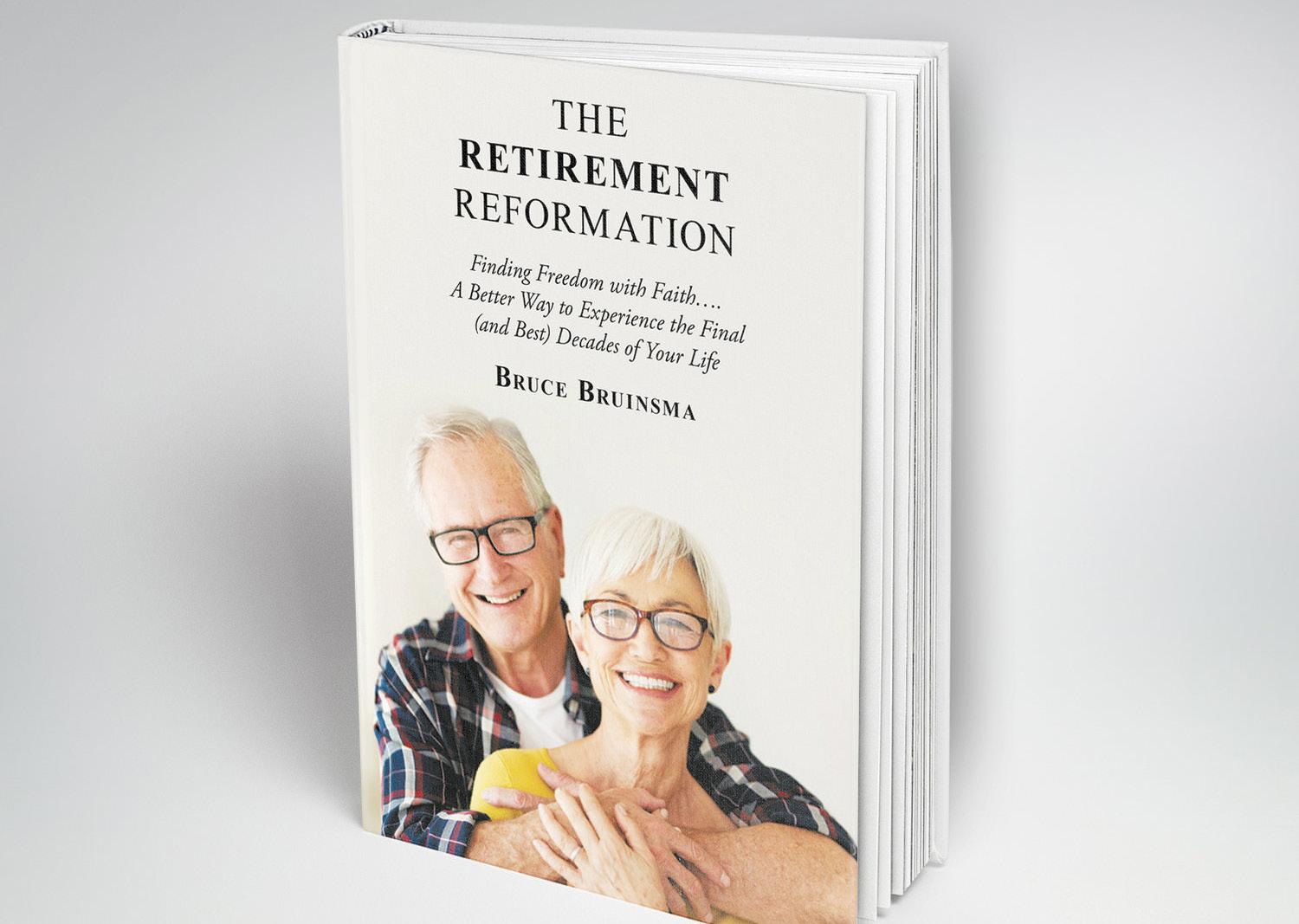12 MONTH STUDY GUIDE





MONTH 1 / MEETING 1 / page 4
MONTH 1 / MEETING 2 / page 8
MONTH 2 / MEETING 2 / page 14
MONTH 3 / MEETING 1 / page 18
MONTH 3 / MEETING 2 / page 20
MONTH 4 / MEETING 1 / page 24
MONTH 4 / MEETING 2 / page 26
MONTH 5 / MEETING 1 / page 30
MONTH 5 / MEETING 2 / page 32
MONTH 6 / MEETING 1 / page 36
MONTH 6 / MEETING 2 / page 38
MONTH 7 / MEETING 1 / page 42
MONTH 7 / MEETING 2 / page 44
MONTH 2 / MEETING 1 / page 12 MONTH 8 / MEETING 1 / page 48
MONTH 8 / MEETING 2 / page 50
MONTH 9 / MEETING 1 / page 54
MONTH 9 / MEETING 2 / page 56
MONTH 10 / MEETING 1 / page 60
MONTH 10 / MEETING 2 / page 62
MONTH 11 / MEETING 1 / page 66
MONTH 11 / MEETING 2 / page 68
MONTH 12 / MEETING 1 / page 72
MONTH 12 / MEETING 2 / page 73
Every institution that becomes established begins to take on baggage . . . overbearing structures, misguided ideas, selfish perspectives and so on. Retirement is no different. Over the years, retirement has developed into a multibilliondollar industry designed to sell leisure and comfort at the expense of passion and purpose.
The Retirement Reformation is a practical effort to identify the false beliefs we have developed about retirement and provide Biblically based responses in the form of content and tools that you can use to engage retirees in participating in the reformation.
The reformation is not a manual or a product, but a movement that is bringing together people from around the country to rethink retirement and then put their new thinking into action. This is not a mental exercise but a community who are putting new ideas into action in their lives.
The Retirement Reformation only works when people come together. That is why the reformation is making this 12-month guide available as part of your REFRAME membership. This study will allow you to join with others and study how God views retirement and God’s plan for you in this amazing phase of life.
A year sounds like a long time, but actually it goes quickly when you are learning in community. We have structured a 24-meeting year for you.
“The Retirement Reformation Meets Future Funded Ministry”

Every Christian is challenged to play a role in building God’s Kingdom here on earth.
That call to action extends for a lifetime and not just a season or ending in what the world calls retirement.
Because that challenge extends to the end of our lives, the duration may well continue for 30 years. Somewhere during those years, sources of income to fund the activity, ministry, and actions impacting others will diminish or dry up entirely.

Recently, I received a call from a longtime friend who lives in a retirement facility. He just moved to an assisted living area that costs $4,300 per month. Sadly, the amount of money he had in his various accounts would only last 13 months at this rate.
He was calling to ask, “What do I do in the 14th month?” I spoke with the facility’s Executive Director and explained the problem. Fortunately, they have a benevolence fund that could pay the difference between my friend’s Social Security income and the increased monthly cost. This solution was in stark contrast to what he feared: “I guess I’ll have to die in the next 12 months.”
The term “Future Funded Ministry” was given to me in the mid 90’s by a group of ministers struggling with the issue of saving for retirement. The thought, “God will take care of me during retirement,” has been the common refrain in past years and some circles still today. As illustrated above, if you die before the money runs out, it may work out that way.
Setting aside resources today for ministry in the future is what Future Funded Ministry is all about. It recognizes the reality of longevity and the ongoing call to ministry.
As suggested above, money plays a role in virtually every decision, both short term and long term. It is important how we steward God’s financial resources. However, there is so much more to God’s call on our lives during our senior years.
Our society, and sadly most Christians, focus on retirement funding, or the lack thereof, as the primary retirement issue. Strange as it may sound from someone who has dedicated 30 years with helping Christians save, money is the least important part of the retirement equation. This is where the “Retirement Reformation,” a new movement to change the way we view retirement, comes in.
With all the emphasis on having enough money, we’ve lost the most important priority. Studying God’s word, we learn that God has a plan for our lives, which was conceived before the beginning of time. Also, each phase of our lives, from birth to death, plays a role and prepares us for the next stage.
Ministry is defined as “changed lives.”
We each have a part impacting others to move forward in their spiritual and relationship journeys. It may mean we help in physical ways too, but only as a part of the process opening the highway to heaven. The goal of the Retirement Reformation is to help move Christians from focusing on leisurely indifference to active caring.
The challenge we face is not an economic one but a spiritual one with an economic component.
Reflecting Jesus to the world requires the greatest change in most of us. Thankfully, Jesus carried through on his promise that his Holy Spirit is with
us providing guidance, protection, and growing Godly wisdom. While we trust Him to provide resources, it is part of the operating plan that we steward all the resources provided: spiritual, mental, emotional, physical, and financial. Not just financial or one of these, but all of them.
Life is a spiritual journey with God. He designed us for a relationship with him. That relationship extends to the end of our earthly time, and then takes on additional dimensions in eternity. The Retirement Reformation recognizes God’s call on our lives and promotes the unity of believers reflecting Jesus and impacting the world. It also focuses on the preparation, the DNA of meaning taking place during the 50 plus years of preparation. The reformation that takes place in our thinking then extends to our unique call to ministry during the last 30 years.
We begin our personal reformation, changed thinking, by embracing the truths of the Retirement Reformation. One of those truths includes the future funding of ministry. It is preceded by the recognition to follow God’s unique call on our lives to the very end. The Retirement Reformation meets Future Funded Ministry at the juxtaposition of changed thinking and future planning; at the crossroad of God’s call to be and the challenge to go.
1. HOW DO YOU FEEL ABOUT THE STATEMENT, “GOD WILL PROVIDE FOR ME IN RETIREMENT?”
2. WHAT ROLE HAS MONEY PLAYED IN YOUR RETIREMENT JOURNEY?
3. WHAT ARE SOME OF THE RESOURCES GOD ASKS US TO STEWARD AT EVERY STAGE IN LIFE?
4. HOW WOULD YOU DESCRIBE THE UNIQUE CALLING GOD HAS ON YOUR LIFE?
Book: Read the “Introduction to The Retirement Reformation”

1. WHAT STOOD OUT TO YOU FROM JOHN PIPER’S WORDS?
2. OF THE VARIOUS SCRIPTURES HE CITED, WHICH ONE SPOKE TO YOU? WHY?
The Retirement Reformation is a powerful statement that addresses an important issue; Retirement in our culture and times.
The Manifesto represents the combined recognition of key retirement thought-leaders about living with faith and purpose in every stage of life. The focus of the Manifesto is to shine the bright light of Jesus on the void that exists for so many as they transition into retirement for the first time or moving through to any of the 3 stages of retirement.
A Retirement Reformation Roundtable assembled in Colorado Springs during November of 2018 was the launching point for the Retirement Reformation Movement. The assembled 15 thought-leaders, authors and consultants, concluded that there was a need to state clearly the keys to the Reformation and allow those who connect with the message to join the movement.

The Manifesto acknowledges that is by the power of Jesus that allows us to live with faith and experience the fulfillment in every season of life. In searching through all the verses in the Bible that address how we are to live and prioritize the building of God’s Kingdom, we agreed that John 15:16 provided the direction and key understanding we needed:
“You did not choose me, but I chose you and called you so that you might bear fruit - fruit that will last and whatever you ask My Father’s
name, He will give it to you.”
Jesus’ transparent message establishes both the relationship between our God and ourselves and reaches into our inner being that directs our life with the benefit in mind of bearing fruit. It also encourages us that we are not alone as we step out into each of our unique fruit bearing missions.
The Retirement Reformation is called to be a movement. The growth of a movement is different from a project, sale of a book or other materials, or any other self-directed activity. The key to a movement is that its leaders must come with “open hands”, inviting all who react to the message or identify with the issues, to join. Each person then becomes a messenger for the mission, recognizes the reality of longevity, and believes that God does have a call on his or her life for a lifetime.
Helping the Body of Christ to reform its understanding of Retirement:
The Retirement Reformation Manifesto not only challenges each individual to examine, re-focus, re-position and reenergize their retirement action plan, but also challenges the Church to do the same. Churches and communities of believers have solid members and believers, primarily by age. The lack of intergenerational interaction and community does a disservice to both ends of the age spectrum. The young are kept from the wisdom of the aged. The aged are kept from the vision and energy of the young.
I was recently asked how many Christians fit the definition of a senior, say 65 plus. We are approaching 30,000,000 and growing. Unfortunately,
if even a third of those were connected with the message of the Retirement Reformation and made themselves available for meaningful Kingdom building service, our churches and parachurch organizations are not prepared to engage them with meaningful ministry.
There are two groups of “unprepared” Jesus followers:
1. The chosen individual who knows what they are retiring from, but no clear picture of what they are retiring to.
2. The Christian organization who does not appreciate the tremendous unused capacity sitting in their pews or at least on the sideline.
The Retirement Reformation Manifesto is calling both categories of Jesus followers to a new understanding and the associated new action plan.
The Manifesto details and asks those who connect with it to affirm 10 principles. Each one addresses a vital element and commits to a new way of thinking and acting. The Retirement Reformation Manifesto #2 will begin to examine those 10 principles. In the meantime, share this blog with a friend who may need to connect with the Retirement Reformation.
1. HOW DOES JOHN 15:16 DEFINE OUR RELATIONSHIP TO GOD IN RETIREMENT?
2. WHO ARE THE TWO GROUPS THAT NEED TO PREPARE BEFORE THE RETIREMENT REFORMATION CAN TAKE HOLD?
3. WERE YOU SURPRISED BY THE NUMBER OF AMERICANS OVER 65? WHAT JUMPED OUT AT YOU ABOUT THAT NUMBER?
4. WHAT DO YOU HOPE TO LEARN AS YOU STUDY THE 10 PRINCIPLES IN THE RETIREMENT REFORMATION MANIFESTO?
Book: Discuss Chapter 1

1. HAVE YOU HAD A CONVERSATION ABOUT RETIREMENT RECENTLY? WITH WHOM? ABOUT WHAT?
2. OBSERVING OTHERS IN RETIREMENT, LIST THREE THINGS YOU’VE NOTICED, WONDERED ABOUT, OR RAISED ISSUES FOR YOU.

3. DO YOU KNOW SOMEONE WHO HAS DONE A GREAT JOB PLANNING FOR RETIREMENT AND IS CARRYING IT OUT? MAKE SOME NOTES ABOUT WHAT YOU’VE OBSERVED.
4. DO YOU KNOW SOMEONE WHO HAS NOT PLANNED AND IS STRUGGLING AS A RESULT? MAKE SOME NOTES OF WHAT YOU’VE OBSERVED.

Welive for more than our culture’s definition and expectations of retirement.

When we interact with those either about to enter retirement or one of the stages of retirement, freedom is a priority for most. When we explore the meaning of freedom, there are multiple perspectives.
Most of us think about the freedoms we enjoy in the United States as a result of our revolution and exchanging the taxation bonds of England for the messiness of our governance. Starting there, it is easy to get excited and passionate about breaking away from anything that pains us and it is a beautiful thing.
I just got an email from a friend who has been in physical pain for a couple of years. She was excited, almost giddy, about finding a solution to her pain. She described it as being free of pain. Experience freedom from pain for the first time in a long time. What a blessing.
Within the context of the Retirement Reformation, we are challenged to reframe our thinking about Retirement - those years after the paycheck stops, or after we’ve sold our company, or moved from a non-profit position to a truly nonprofit position.
Our thinking about these last stages of life is so dominated by our culture. First, our culture suggests that retirement is one homogeneous period. It doesn’t say that directly, but the ads, the messaging all suggest “retirement” as one event, not a series of stages. Our challenge then is to rethink and reframe how we think about this upcoming time or the next stage of life.
By in large, we frame retirement as freedom from all the things we don’t like about our working life or our career. Mainly we think about freedom from work. Here is a
dictionary definition of work: “Activity involving mental or physical effort done in order to achieve a purpose or result.”
Freedom from work or not having to make an effort sounds so good, yet when we explore what brings us joy, it is not so much the absence of work or effort, but what the work or effort entails and accomplishes.
Unfortunately, we don’t take the next step in the thought process of “freedom from” and ask the next question in the sequence, “freedom to”. What are we now free to do given that we’ve thrown off the shackles of the job?
Our culture defines retirement as one long, downhill slog experiencing decreased physical and mental abilities ending in death with the goal of jamming as much leisure activity as we can into the intervening years. It would seem like our goal is to accomplish nothing and to have fun doing it. Not much meaning and purpose there.
A better goal is to find freedom from that meaningless void and replace it with activities filled with meaning and purpose to us, and to others. I’ve been on ships arriving in New York harbor and have seen the faces reflecting the joy of expected freedom in America. The Statue of Liberty is indeed a beacon of
hope. As a 7-year-old I experienced the results of Nazi occupation and terror in the Netherlands. Arriving soon after the liberation of the Netherlands, I saw the excitement, the relief, and the sheer joy as freedom appeared in the form of US Aid.
I’ve seen the joy on the face of an Indian woman learning what freedom in Christ can mean for her relationship with her husband and children. Freedom is the shout. Freedom is the desire. Freedom is critical. Freedom in Christ is best. Knowing that we are free from sin because of God’s grace and Jesus’ sacrifice - it doesn’t get much better than that!
We have included freedom as the first of the Retirement Reformation Manifesto principles. Without experiencing the freedoms I’ve just written about, the rest of the Manifesto will ring hollow. With freedom comes the open door to respond to God’s call, become more than we are, and serve those in need fulfilling our unique role in building the Kingdom of God here and now.
As you read and connect with the Retirement Reformation Manifesto, be assured that you are joining a growing throng who say with you, “Give me the freedom to know God’s plan for the next stage of my life and the passion to put it into action!”
1. WHAT ARE EXAMPLES IN YOUR OWN THINKING WHERE YOU HAVE VIEWED RETIREMENT AS “FREEDOM FROM?”
2. IF YOU HAD TO IMAGINE WHAT RETIREMENT MIGHT BE “FREEDOM TO,” WHAT WOULD YOU SAY?
3. ARE YOU EXPERIENCING “FREEDOM TO” TODAY OR IS IT SOMETHING THAT YOU ARE JUST NOW RECOGNIZING?
Book: Discuss Chapter 2-3

“PEOPLE DON’T PLAN FOR RETIREMENT” & “THE DREAM OF DOING NOTHING”
1. BRIEFLY LIST THE THREE KEY HIGHLIGHTS OF YOUR WORK EXPERIENCE OR CAREER.
2. HOW DID YOU OR WERE YOU PREPARED FOR YOUR WORK, CAREER? HOW MUCH OF YOUR PREPARATION WAS INTENTIONAL? IF SO, HOW?
3. WHY IS PLANNING FOR RETIREMENT ABOUT MORE THAN MONEY?
4. WHAT IS THE ROLE OF MONEY IN RETIREMENT?
1. ARE PERSONAL GOALS FOR RETIREMENT DIFFERENT THAN GOALS DURING YOUR WORKING YEARS? IF SO, HOW?
2. WHAT DO YOU THINK ABOUT DOING “NOTHING” OR “ONLY LEISURE ACTIVITIES” IN RETIREMENT? WHY?
3. ARE LEISURE ACTIVITIES THE SAME AS DOING “NOTHING”, OR ARE THEY DIFFERENT? WHY?
4. RIGHT NOW, WHAT ARE YOUR RETIREMENT GOALS? OR, YOUR GOALS FOR THE NEXT STAGE OF RETIREMENT?

Manifesto: Discuss Preparation
THE RETIREMENT REFORMATION MANIFESTO PRINCIPLE #2 PREPARATION

Wechoose to enter each new season with a God-directed vision of His preferred future for us.
During the coldest of days and the darkest of seasons, there is the promise of another season of warmth and light. As God created the universe there were intense periods of creative upheaval followed by the arrival of peace, beauty, and purpose. So too are our lives.
Think back about the turbulent times in your life. Those times of intense pain or perhaps fearful times. Those times also held the promise of something new, something different, something better, and something beautiful.

It does not always work out that way, often because of the choices we make and the focus we choose. When we choose to be trapped, always turning inward, we keep a lid on new light and remain in the darkness. When we let the light in, by turning towards it, the rejuvenating Spirit of God enters giving us hope and a pathway to God’s preferred future for us. Be encouraged.
God does have a preferred future for us, one created before the beginning of time. Each new season can and should be a season of preparation for what is next. The next season builds on our choices previously made and the lessons learned as a result.
I’ve always been impressed by the great coaches in sports. As each new season approaches and the team gathers for training, it is basic preparation that receives the most attention. Baseball is a simple game. You catch, you throw, you hit, you run. That’s all there is to it. Yet the greatest teams are also the best at the fundamentals and have times of renewal each Spring. Times for review and enforcing muscle memory so that the fundamentals always
provide the base for the triumphs of Fall.
If we ignore the preparation, we will not experience the fruits of the process. When we embrace spiritual and emotional preparation, the resulting maturity is the springboard for the next season of personal fulfillment and then even greater growth.
Our God is a God of growth. Growth without preparation leads to pain. Growth coupled with preparation leads to love, joy, peace, patience, kindness, goodness, and self-control. The fruits of the Spirit that spring from God’s preferred future for each of us.
Preparation is not for the faint of heart or the weak of spirit. Preparation may be the hardest principle to live out because it takes both work and intentionality. If you are distracted by all the world’s merry-gorounds, you will miss grasping the basics, practicing the basics, learning from the basics, and experiencing the power that comes from mastering the basics.
The basics of the God-directed life and heart of the Retirement Reformation are prayer, purpose, and practice. In order to connect with those, it requires ongoing interaction with God’s revelation for us in the Bible. If you ignore the manual, you’ll miss the pathway. Try re-programming your garage door opener without the manual. Try driving to your next appointment or even a new restaurant without Google Maps or Waze. Getting the manual out and reading it before you start, or putting the destination in before you start driving, makes it much easier.
One final thought: As the universal church and as Jesus’ representatives here on earth, we will live out our personal preferred future with greater joy and
effectiveness if we both learn from each other and are willing to coach, mentor, and walk-along-side-of each other.
There are a couple of aspects to this:
1. There is a great transfer of wealth occurring in the Western world from the Baby Boomer generation to the next. There needs to be a concurrent transfer of wisdom from this generation to the next as well. Enabling this transfer of wisdom is one of the goals of the Retirement Reformation. The essence of being prepared is learning from those who have experienced the pain of growth and the willingness to acquire wisdom from others.
2. Mentoring and coaching are systematic activities to enhance the preparation of others. We learn through our own experience and then passing that experience on to others. When we do it systematically, effectively and efficiently the impact is profound. Mentoring and Coaching are foundational to the success of the Retirement Reformation, changing the way we think and act during the last decades of life.
God’s call on our life will best be carried out when we are prepared spiritually, emotionally, physically, and relationally. We choose to enter each new season with a God-directed vision of his preferred future for us. A principle worth living out. Be prepared.
1. WHAT IS THE CONNECTION BETWEEN PREPARATION AND FRUIT?
2. WHAT DO YOU THINK IT MEANS WHEN HE SAYS, “GROWTH WITHOUT PREPARATION LEADS TO PAIN.”?
3. YOU MAY KNOW WHAT WEALTH YOU HAVE TO TRANSFER TO ANOTHER GENERATION BUT THINK ABOUT THE WISDOM YOU MIGHT HAVE TO GIVE TO THOSE YOU LOVE.
Book: Discuss Chapter 4-5

“A LIFE OF LEISURE” & “THE LONGEVITY REVOLUTION”
1. HOW DOES THE PHRASE “MEANING AND PURPOSE” CHALLENGE YOUR THINKING? OR DOES IT?
2. DOES HAVING IDENTIFIED “MEANING AND PURPOSE” FOR YOUR LIFE CHANGE ANYTHING? IF SO, HOW? IF NOT, WHY NOT?
3. WHAT IS THE ROLE OF LEISURE IN YOUR RETIREMENT PLAN? ARE YOU AND YOUR SPOUSE ON THE SAME PAGE ABOUT THE ROLE OF LEISURE? WHAT KIND OF LEISURE ACTIVITIES ARE IMPORTANT TO EACH OF YOU?
4. CAN YOU FIND A KINGDOM BUILDING PURPOSE IN YOUR LEISURE PURSUITS? IF SO, WHAT IS IT?
5. WHAT IS A GOOD MIX OF LEISURE AND “MEANING AND PURPOSE” FOR YOU, AND FOR THE NEXT DECADES TO COME?
1. WHY IS IT IMPORTANT TO UNDERSTAND THE REALITY OF LONGEVITY?
2. WHAT ARE SOME KEY BENEFITS OF LONGEVITY?
3. WHAT NEW CHALLENGES ARE CREATED BY LONGEVITY?
4. BASED ON YOUR HEALTH AND FAMILY HISTORY, AS YOU KNOW IT, HOW LONG DO YOU EXPECT TO LIVE?


We embrace the promise of the fruits of the Spirit and reject the self-indulgent trappings of retirement.

Our vision of a lifetime of service requires re-focusing, re-positioning, re-vamping, and re-energizing as we prepare for, enter, or experience retirement. The allure of doing “nothing” with eternal value, fades quickly.
How easily we become distracted. One of the most effective ways to neutralize an otherwise effective course of action or priority is to lose focus and become distracted. Politicians and magicians use this strategy all the time. When we focus on anything other than our top priority, we lose effectiveness, impact and the opportunity to experience the joy of finishing well.
Who does not want to experience what the Bible describes as the fruits of walking with God, the fruits of His spirit indwelling or being a part of us? Reflect on these benefits, these attributes of lessons learned, being connected to God’s spirit, and following Jesus’ teaching and modeling: love, joy, peace, patience, kindness, gentleness and self-control.
The message of the Retirement Reformation makes it clear that filling the void of retirement with self-indulgent leisure or some other version of “nothing” is self-defeating if you do want to experience the Fruits of the Spirit.
When you contemplate the transition from career or from entrepreneurial ownership to the freedoms inherent in the next lifestage(s), we are clear about what is being left behind, but not so clear about what is ahead. Herein lies the challenge. We are often sucked into the vortex of believing that a transition to nothing is going to be the new nirvana. It never is.
My doctor once asked me about my vacation schedule for the year. When I responded that I took one full week away and then a number of long weekends he began his prescriptive lecture. “You can’t come down to a point of rejuvenation in one week. It takes two weeks to get to a neutral point when re-energizing can begin. It then takes another week to actually re-energize and be ready to function at full efficiency, with energy and purpose”. I admit to being shocked. I’d never heard that before and certainly never practiced this approach to refocusing myself physically or emotionally. It made sense and so I tried it and he was right.
Our working lives and the transition either into retirement, or into the next stage of retirement, has some similarities to the annual vacation prescription my doctor shared. Our working careers may be fulfilling in and of themselves, or not, as the case may be. When the time for transition occurs, the idea of a long vacation is appealing, maybe even necessary. However, there comes a time when healing or restoration is over, and the lack of meaning and purpose becomes a point of pain or at least a point of vague disquiet. There is something missing or something wrong.
In some fashion, God’s way of bringing deep seeded contentment evidenced by the Fruits of the Spirit occurs not in the middle of nothing but occurs when we are rejuvenated and doing His work of representing Jesus to a hurting world and impacting others, helping them to heal and move to their own God directed and preferred future.
Contentment and peace are interlocking pieces to the same puzzle. We
find contentment when we are operating in God’s will and in His way. Peace with ourselves and peace with others is such a relief. The stress of conflict and the tension of striving just for ourselves is hard and we become weary. It’s not a matter of work, because we work at whatever we do. The choice is to work within the parameters God makes available to us and then the “burden is light”. Have you noticed that the sweat on your brow from doing what you are passionate about is different than the sweat on your brow from other struggles? We think that “no sweat” is the best answer. The sweat that occurs because we are following God’s plan for our lives, is a sweet sweat.
You can be content, or at peace, even in the middle of turmoil. This kind of contentment is more like the assurance that your responses and actions reflect how Jesus says we are to live and will result in the best possible outcome. This confidence is contentment producing. Whatever the outcome, there is a new day dawning. As the preacher opined, “It’s Friday and Sunday is coming”. Our Savior died and rose again, so our eternal place of contentment is assured. The final and greatest Fruit of the Spirit.
The Retirement Reformation’s principle and a promise of the availability and reality of living a content life is one of the greatest gifts our God gives to us. We just make it hard. Re-focusing, re-positioning, re-vamping, and re-energizing are the pathways to re-doing our thinking about the last decades of what can be joy-filled, productive and God-honoring life-stages ahead. The allure of doing nothing with eternal value fades quickly.
1. WHAT HAPPENS WHEN WE LOSE FOCUS?
2. AS YOU CONSIDER THE FRUIT OF THE SPIRIT, WHICH ONE DO YOU DESIRE AT THIS STAGE IN YOUR LIFE? IS THERE ONE GOD HAS PUT ON YOUR HEART? WHY DO YOU THINK THAT MIGHT BE?
3. CAN YOU IDENTIFY A TIME WHEN YOU HAVE HAD THE ASSURANCE THAT YOUR ACTIONS REFLECTED JESUS’ PRIORITIES AND PERSPECTIVES?
Book: Discuss Chapter 6-7 “FAITHFUL

1. WHAT DOES THE TERM, “FAITHFUL FOR A LIFETIME” MEAN TO YOU? HOW LONG IS A LIFETIME TO YOU?
2. LIST THREE KEY TIMES OF TRANSITION IN YOUR LIFE, AND WHAT YOU LEARNED FORM EACH ONE.
3. HOW HAVE YOU HEARD GOD’S CALL ON YOUR LIFE?
4. DOES THE IDEA OF A CHANGE IN YOUR THINKING ABOUT RETIREMENT, A RETIREMENT REFORMATION, MAKE SENSE TO YOU? WHY OR WHY NOT?
1. CAN YOU, OR SHOULD YOU, IGNORE THE ISSUES ABOUT OR THE REALITY OF RETIREMENT?
2. WHAT THREE QUESTIONS ABOUT RETIREMENT ARE RELEVANT, INTERESTING, OR PRESSING TO YOU?

3. WHICH OF THOSE HAD YOU NOT CONSIDERED BEFORE?
4. WHAT WERE THE BIG TAKE-AWAYS FOR YOU FROM THIS CHAPTER?
Manifesto: Discuss Stewardship
THE RETIREMENT REFORMATION MANIFESTO PRINCIPLE #4 STEWARDSHIP

The reality of longevity demands that we see all retirement seasons as a resource to be appreciated, embraced, valued, and to faithfully steward. We are committed to healthy living.
Spike Lee recently received an industry award. His reaction to the length of time between when he started in the industry and when he was recognized says a lot: 30 years is a long time, ain’t it?
For the first time perhaps since the fading of the long-lived patriarchs of Genesis, like Methuselah, we are faced with the reality of longevity. Because we live it one day at a time, we don’t recognize the significance of what is increasingly a 30-year period between 65 or 70 and our end time, often ranging up to 30 years.
Reflect on any 30-year period of your life. Take the years between 20 and 50, did anything of significance happen to you during that period?
Yes, just about everything changed. You grew up, became self-sufficient, got married, had kids, became a grandparent, all in those 30 years.
That personal example should be enough to highlight the changes coming in any 30-year period. Yet, most of us think of the retirement years, and even the preparation time prior to retirement, as one homogeneous life stage. Nothing could be further from the truth.
10,000 people are turning 65 every day in America. Not only is there an explosion of those over 60, but there is an explosion of those over 100. The centenarians, those over 100, are expanding because the septuagenarians, those between 70 and 79 are growing at an astounding rate.
The reality of longevity leads us to ask some new and serious questions:

We realize retirement may extend for thirty years or longer
What will we do during those 30 years is one of them? Our increasing life span is a precious resource, one to be valued, cherished and seen with a stewardship perspective. Webster defines stewardship as the careful and responsible management of something entrusted to one’s care. Biblically speaking, we are to be good stewards not only of our money but of our time, talent, resources, relationships, and our health.
In order to be a good steward of those upcoming years, regardless of your age when you read this, there needs to be an appreciation for what is being carefully and responsibly managed for the preparation of the new experiences ahead, freedom to embrace at least three new stages of life, and the willingness to hear God’s call prior, to, and during each one of those stages.
A mighty big order, and one that needs to have the Light of Life shined on it, the Light of the Word reflected in it, and the Light of the Spirit speaking into it. Our stewardship of the Preparation life-stage, the Active life-stage, the Mentoring Life-stage, and the Reflective Lifestage are equally important.
All that being said, it’s complicated. The retirement years will encompass times of great joy and pleasure, service and relationship plus times of pain, self-doubt, and challenging relationships. It is during these times we can, are to reflect the love of Jesus, to the world while simultaneously demonstrating the true meaning of being a Jesus follower. The reality of longevity allows us increased time and increased opportunity to do what we are called to do.
Here are two additional observations demonstrating the impact of longevity. There are families with up to 6 generations still living. 5 generations are not uncommon, and 4 generations are becoming commonplace. The impact of those generations and the interrelationships between them add to the complexity. Finances, cultural differences
between the generation, and living relationships all become more complex as the number of living variables increase.
Because we are becoming an increased society of sitting rather than exercising, or at least moving around, health issues grow right along with the emotional and relational ones. The Retirement Reformation wants to change the way we think about health, as well as all the other topics requiring changed thinking, refocusing and re-energizing. Our health practices need as much reforming as all the other aspects of our life.
A recent new release shared the startling fact that by the end of 2019 there will be as many over 60 in this country, as there are under 19. We have a barbell reality, big groups on either end of life’s spectrum. Our churches pay a lot of attention to the younger end of the age spectrum, as well they should. However, there is little attention being paid to supporting the life and activity stewardship of those over 65. It is time the Church and our other faithbased communities wake up to the need, the opportunity, and the necessity of stewarding this growing and precious resource. “Keep giving and don’t be grumpy!” are not the only message needed. “We love you, we need you, and here are multiple ways to serve the kingdom within our fellowship” are the new clarion call of the Retirement Reformation to the church.
The result of longevity in our times, and how we steward this new gift, will determine whether we hear the words, good and faithful servant, or not. Lean into this principle of stewardship. Meaning, purpose, and fulfillment will be the result.
Psalm 24:1 The earth is the Lord’s, and everything in it, the world, and all who live in it.
1. WHAT CHANGES ABOUT RETIREMENT WHEN YOU LOOK AT IT AS A RESOURCE TO BE STEWARDED?
2. DO YOU SEE GREATER LONGEVITY AS A GIFT OR AS A BURDEN? HOW DOES LOOKING AT RETIREMENT AS A CALLING IMPACT THAT VIEW?
3. IF EVERYTHING BELONGS TO GOD, HOW DO YOU THINK HE SEES YOUR RETIREMENT YEARS? HOW DOES HIS VIEW IMPACT WHAT YOU WILL DO TOMORROW?
Book: Discuss Chapter 8-9

“THE LONGEVITY PREMIUM: SIX GREAT BENEFITS OF AGING THAT SENIORS SAVOR” &
“PREPARING FOR THE THREE STAGES OF RETIREMENT”
1. WHAT IS YOUR VIEW? DO YOU SEE THE COMING YEARS OF RETIREMENT AS A LONG, DOWNWARD SLOG? OR DO YOU VIEW THE FUTURE AS A GOLDEN OPPORTUNITY TO ACHIEVE THINGS YOU COULDN’T BEFORE? OR ARE YOU SOMEWHERE IN BETWEEN?

2. TAKE ANOTHER LOOK AT THE SIX LONGEVITY PREMIUMS IN THIS CHAPTER. HAVE YOU EXPERIENCED ANY OF THESE BENEFITS YOURSELF? HOW?
3. HOW DO YOU THINK YOU COULD USE YOUR RETIREMENT YEARS TO DEEPEN YOUR SPIRITUAL LIFE?
4. DO YOU EVER FEEL GOD IS CALLING YOU TO ASSIGNMENTS THAT YOU WERE NOT ABLE TO FULFILL DURING YOUR WORKING LIFE?
1. THERE ARE THREE STAGES OF RETIREMENT OUTLINED IN THE CHAPTER. LIST THEM HERE: THEN NOTE A PERSON OR COUPLE YOU KNOW WHO ARE IN EACH STAGE.
2. WHICH OF THESE STAGES OF RETIREMENT ARE YOU IN RIGHT NOW? OR ARE YOU IN THE PREPARATION STAGE?
3. WHAT ARE THE MAIN CHALLENGES AND TASKS FOR YOU DURING THIS STAGE OF RETIREMENT OR PREPARATION?
4. ONE OF THE CONSISTENT THEMES THROUGH ALL THREE STAGES OF RETIREMENT IS THE NEED TO EVALUATE, DEVELOP AND UTILIZE YOUR RESOURCES. BUT PERHAPS YOU HAVE NEVER THOUGHT ABOUT ALL THE WISDOM AND INSIGHT YOU HAVE BUILT UP OVER A LIFETIME. TAKE SOME TIME AND WRITE DOWN THE KEY GIFTS YOU HAVE, BOTH NATURAL AND SPIRITUAL.THIS ANALYSIS CAN HELP PREPARE YOU FOR DEVELOPING AND USING THESE GIFTS DURING YOUR NEXT LIFE-STAGE.

Weacknowledge that people matter to God and we cultivate our hearts for others.
The essence of God is love. Love is expressed in relationship and relationship lives in community. Here is the heart of the matter: “God so loved the world that he gave his only begotten son, that whosoever believes in him will not perish, but have everlasting life.” John 3:16
Does God love me and how do I respond to that love? Jeremiah 31:3 says: “I have loved you with an everlasting love.”
Our response to this immense love is to love back and then reflect that love to others: You shall love the Lord your God with all your heart, and with all your soul, and with all your mind. This is the first and great commandment. And the second is like it. You shall love your neighbor as yourself. On these two commandments embrace all the law and the prophets. Matthew 22:35-40 and Mark 112:28-34
These two complementary and inter-connected commands expand our understanding of how to live with God, ourselves, and each other. The older we grow, the greater the opportunity to understand the value and application of love in our lives.
One dividend of aging is the opportunity to grow both in spiritual and emotional maturity. Growing closer to God enhances wisdom and growing emotional maturity enhance relationships. We learn both the meaning and application of love.
Most of us have relationships that need work. There is a strained or separated relationship somewhere in our cupboard. Longevity allows us the additional time to grow emotionally and increase our ability to deal with, speak into, and reconnect with those estranged from us. In any circumstance, at least

attempting to make those relationships whole will reflect God’s love for us now through us to others. This is more than just being nice—this is another version of loving your neighbor.
That neighbor may be a parent(s) or grandparent(s), sibling, son or daughter, grandson or granddaughter, even great grandson or great granddaughter. Co-workers, past or present, business partners, or employees all come to mind as minefields of strained relationships. We can revitalize, or at least do our part to regenerate broken relationships using the increased emotional maturity available to us. We do it because he first loved us.
There once was a grumpy old man who managed to irritate just about everyone with his mistreatment, short temper, and cutting tongue. Over the years he became estranged from family, co-workers, and neighbors. As he grew older, he wondered why he had no friends. Loneliness set in and fear of the future exploded.
At a trip to the store, he met a woman who seemed to ooze kindness and love. Not wanting to live out his
years alone, he adopted a new persona with her, they fell in love, and married. Then he resorted to his old and original behavior. She dragged him to church and to a small group. There he heard the two commandments and what they meant. Then he had a stroke and could not care for himself. As his wife cared for him and at this late stage in life, he both re-experienced love and started to learn what love meant. He softened and learned to love back.
It’s never too late to love. People matter to God and he’s demonstrated love in all ways possible. The Retirement Reformation embraces that love and challenges us to reflect it in all we do. God loves us and prepares us for ongoing service, building his Kingdom here, now. As we answer the call and are faithful for a lifetime, we will experience love as fruits of the Spirit. What a blessing we have as Jesus followers during all the stages of life— especially during the last ones.
1. HOW DO YOU RESPOND WHEN YOU ARE SHOWN LOVE?
2. WHY DOES AGE GIVE US GREATER ABILITY TO SEE AND APPRECIATE LOVE?
3. THINK OF A RELATIONSHIP YOU HAVE THAT IS BROKEN AND IN NEED OF JESUS’ LOVE. WHAT MIGHT YOU DO IN RETIREMENT TO SEE THAT RELATIONSHIP CHANGE?
Book: Discuss Chapter 10-11

“THE POWER OF A PLAN” & “GETTING TO RETIREMENT”
1. WHAT IS THE DOWNSIDE OF NOT PLANNING?
2. WHAT IS THE DOWNSIDE OF NOT LISTENING TO GOD’S PLAN?

3. MANY PEOPLE DO “RETIREMENT PLANNING” WHEN IT COMES TO THEIR FINANCES, BUT THEY FAIL TO DO EQUALLY ROBUST PLANNING WHEN IT COMES TO HOW THEY WILL SPEND, INVEST, THEIR LIVES IN RETIREMENT.
FOR A MOMENT, FORGET ABOUT MONEY AND FINANCES AND ANSWER THESE QUESTIONS:
4. WHAT DO I MOST WANT TO DO MOST IN RETIREMENT?
5. WHAT DO I NEED TO DO MOST IN RETIREMENT?
6. WHAT ARE SOME OTHER ACTIVITIES I WOULD LIKE TO DO OR GOALS I WOULD LIKE TO ACHIEVE IN RETIREMENT?
7. WHAT DO I WANT TO ACHIEVE WITH MY SPOUSE, MY FAMILY, DURING RETIREMENT?
8. HOW DO I WANT TO IMPACT OTHER PEOPLE DURING RETIREMENT?
9. WHAT’S ON MY “BUCKET LIST”?
10. WHAT DO I SENSE GOD CALLING ME TO DO DURING RETIREMENT?
1. DESCRIBE YOUR “MONEY” POSITION? GOOD/BAD/SO, SO/DON’T KNOW
2. WHAT CHANGES, IF ANY, DO YOU NEED TO MAKE TO ADDRESS THIS MONEY ISSUE?
3. AM I ON THE SAME PAGE AS MY SPOUSE ABOUT MONEY?

Our retirement years are best spent in community. It is in community with family, friends, fellow believers, plus the week, poor and disenfranchised where we both learn and serve. The intergenerational church provides a community between and among believers.

The first books of the Bible talk about community in its interaction between God’s community of believers, their connection with Him, and their distinction with outsiders. Community was important is many ways.
The community of the New Testament was The Church. Jesus’ ministry of love and relationship was to be carried out by the Church with the guiding light of the Holy Spirit. Jesus identified differing roles to lead the church and pointed out that each of us has a role as, what he called, friends. Paul makes this clear in Ephesians 4:16 when talking about the community of friends – the Church:
“From him, the whole body, joined and held together by every supporting ligament, grows and builds itself up in love, as each part does its work.”
Ken Gire in his book, The Weathering Grace of God makes the point about community with a totally different voice: “Our lives are part of an overarching drama, part sunshine, part rain, that spans the heavens from Paradise to Paradise. So, until then, what? We feel our way in the dark. Until we find each other. We huddle together in the storm. Wet and shivering, but together. And maybe, in the end, it will be our huddling in the storm that gives us more comfort than our understanding of the storm.”
We need community and connection with others in authentic relationship.
Ken is talking about the strengthening of relationships and the blessings we receive when we are in an authentic community and real relationships together.
Those relationships in community are held together with friendship. Lexham’s Theological Wordbook defines friendship: “Friendship is a reciprocal relationship characterized by intimacy, faithfulness, trust, unmotivated kindness, and service.” The concept can describe one’s relationship with people and with God.
Yes, our God is one of relationship – one that He desires, and we choose. When we make that choice, we enter into community with Him and His angels, as well as those he’s brought into our earthly community. God created people to be in a relationship with Himself and with one another in friendship, marriage, family, society and the church. We then are blessed. In 2 Peter 1:3-4, it says, “Jesus has the power of God, by which he has given us everything we need to live and to serve God. We have these things because we know him. Jesus called us by his glory and goodness. Through these he gave us the very great and precious promises. With these gifts, you can share in God’s nature, and the world will not ruin you with its evil.”
Wisdom comes from God, is to be applied in our lives and we then learn from each other. Believers are to be in a relationship with each other. We see this clearly in our church children’s and your adult groups. It surfaces again when young marrieds and young families get together. We see it again when seniors are segregated into separate life groups or Sunday School classes, taking trips, potlucks, and bible studies. All good, but not enough.
God designed our communities to be intergenerational, not segregated. We are to learn from each other with the knowledge and its application carried out from young to old, old to young, and everywhere in between. The
church must expand its vision for connectivity and provide the culture where intergenerational living can not only exist but thrive.
Our communities are getting more complex. Take families for example. One church did a survey and found out that over 20% of its households consisted of 3 generations or more. Technology is one of the reasons why the generations don’t connect. Skype might shorten long distances, but our culture keeps us apart.
We don’t experience community with the weak and disenfranchised, or the 3rd life-stage. This separation leads to confusion and even animosity. We divide our communities by the music we like and the style of dress we wear. If we don’t spend time together, get to know and appreciate our differences in both strengths and weaknesses, we will grow frail, looking inward and downward, both fearful and alone.
It is critical for all of us to expand our relationships, see the diversity in our community, and learn from it while we contribute to it. It is in community that we are truly whole. It is in community that we stay young and help the young to grow old with grace and dignity.
In community we have the opportunity to thrive as both individuals and collectively. Jesus knew that and commanded us to love each other whoever he or she may be. He wants His children, that’s you and me, to represent Him to the world uniquely and collectively. He said, by your love they will know me. I believe the word “your” is both individual and collective. Let’s keep learning about community, be a part of one, and thrive together for his honor and glory. We can huddle in the storm.
This 6th principle of the Retirement Reformation Manifesto brings encouragement to all of us and a clear reminder of our interrelationship with God and those he created.
1. WHAT COMMUNITIES ARE YOU A PART OF? HOW DO THEY ADD VALUE TO YOUR LIFE IN RETIREMENT?
2. DO YOU HAVE OPPORTUNITY TO BE IN COMMUNITY WITH OTHER GENERATIONS? IF SO, WHAT HAS THAT EXPERIENCE BEEN LIKE FOR YOU?
3. HOW DOES “COMMUNITY” HELP YOU TO FULFILL WHAT GOD HAS FOR YOU IN RETIREMENT?
Book: Discuss Chapter 12

1. WHAT IS THE VALUE OF LIVING WITH INTENTIONALITY? OR IS THERE ANY?
2. IS LIVING WITH PURPOSE ABOUT YOU? OR, ABOUT OTHERS?


Werecognize that our calling ends at death, not retirement.
Our entire lives are designed for a purpose and we can continue to grow spiritually and emotionally. This allows God to redeem our past mistakes, revitalize broken relationships and strengthen our commitment to our unique calling. We will follow His purpose, bear fruit, and experience the joy of being a disciple of Jesus.
“If you don’t have a goal, any port will do.” “When you aim at nothing you are sure to hit it.” “If you can afford to do nothing, you can afford to do something.” All of these quotes challenge us to look up, be aware, and do something.

Is your life designed for a purpose? If not, then random rovings are the answer. If so, acknowledging that your life does have some purpose, exploring what this means, connecting with it and acting on it would seem to be the best action plan.
Two recent emails from individuals just exposed to the Retirement Reformation Manifesto illustrates this point; one person listed all their current numerous activities in retirement. He then asked, “What can I do to discover my true purpose?” Clearly, he was neither lethargic nor a couch potato. He was physically and socially active, yet he felt the nothingness of a purposeless existence. Meaning and purpose followed by intentional engagement with God’s plan will fill the void of nothingness that haunts him.
Another email shared the ministry activities and people helping priorities that filled the first 15 years of retirement. Now they were entering another life stage and needed a new focus and a new understanding of what was next. She
wanted to be intentional about knowing “what’s next” but did not know how.
Another variation comes from a daughter who is worried about her 84-year-old mother. The mother had always been active and engaged in helping others but now feels inadequate, unprepared, and at very loose ends.
God has a plan for each of us, and it extends to the end of our lives, not just to some vague mid-point. God called Abram to go to the Ur of Chaldees. He showed him where to go and what to do. Then he called him to another new land and showed him where to go and what to do. It took faith for him to listen and act yet there was always a clear next goal. So, it is with our lives when we live with intentionality.
I believe Abraham changed dramatically from the time he was first called until his last. Remember the story of Abraham taking his son Isaac to the mountain. While it appeared that the purpose was to sacrifice Isaac, and Abraham was prepared to follow through with it, this was not God’s ultimate plan.
God told the Israelites in many different ways, through many different voices, and in many different places, that he had a plan for them. In Jeremiah 29:11 we hear God saying, “For I know the plans I have for you, declares the Lord, plans to prosper you and not to harm you, plans to give you hope and a future.”
Our role then is to grow spiritually, grow emotionally, grow in faith, listen for those plans, and intentionally follow them. When we search for God’s plan, we will certainly find it. However, we do have to be intentional about the searching.
God’s plan for our lives has a purpose. The purpose is to reflect Jesus with our love and to bear fruit. Bearing fruit means the blessed results of our impact or influence on or with others. Whether that result is a cup of cold water or taking positive steps to heal a broken relationship. The result may be to enhance our capability and resolve to carry out His plan; therefore, bearing more fruit.
There are ministries, such as the one connected to the Colson Institute where you can take a gap year going into retirement and be helped to
discover “what’s next.” The result of prayer, study and guided evaluation leads to a purpose statement and an action plan. I’d suggest that the value of this gap year, for those who can afford it, will come up again and again as you face the reality of the next life-stage. The prior quote seems appropriate, “If you can afford to do nothing, you can afford to do something.” Perhaps we can expand on this thought, “If you can afford to do something, you can’t afford to do nothing.”
Whether you are a thinker, a doer, or a reflector, you are called to bear fruit. It is not until we bear fruit that the joy shows up. Not in a selfcongratulatory way but in the deep personal knowledge that listening to the call, responding to it, and carrying it out to the best of your ability is the pre-cursor to those word’s “Good and Faithful servant.”
The Steward’s Manifesto says that God owns it all and we are to be stewards of what we’ve been given. Let’s call this the steward’s yardstick, “What’s your Stewardship score?” How are you doing with both the call and the action plan that evolves from it? Not so good? Now is the time to reverse course and get on God’s track. Then leverage what you’ve learned and what you are doing to even greater glory and rest in the fruits of the spirit that surround you.
The Greek meaning of the word intentional encompasses the idea of seeking and being open to the result. When we seek through reading our Bible, conversing with God, and listening for his voice, our intentionality will bring both peace and freedom. The truth will set us free and freedom will be a great reward - freedom in Christ to follow His example, His words, and deeds in His name. And it goes without saying that our time of relationship and service extends to death not some arbitrary point of retirement or work transition. We are called to live life to the full, for a lifetime, and to be faithful in the process.
This Retirement Reformation Manifesto principle, Intentionality, is a key transition point from embracing to making it happen.
1. WHAT DOES THE WORD “INTENTIONALITY” MEAN TO YOU? HOW HAVE YOU PERCEIVED THIS IDEA IN THE PAST; BOTH GOOD AND BAD?
2. HOW DOES INTENTIONALITY FIT INTO OBEDIENCE TO GOD’S WORD AND DIRECTION?
3. WHY IS IT SO HARD TO BEAR FRUIT IF YOU ARE NOT INTENTIONAL? WHAT KEEPS US FROM FOLLOWING THROUGH WITH THE STEPS THAT WILL LEAD TO FRUIT IN OUR LIVES?
Book: Discuss Chapter 13 “DISCOVERING AND LIVING OUT YOUR CALLING”

1. DO YOU NEED TO DISCOVER YOUR CALLING, OR TAKE NEXT STEPS TO CARRY IT OUT?

2. WHAT DOES IT MEAN TO YOU TO, “LIVE OUT YOUR CALLING?”
3. WHO DO YOU KNOW WHO PERSONIFIES THIS FOR YOU? DESCRIBE THE PERSON OR COUPLE.
4. AT THE VERY END OF YOUR LIFE, WHAT WOULD YOU LIKE TO HEAR?
5. WHAT ARE YOUR NEXT STEPS TO BEING “FAITHFUL FOR A LIFETIME?”

Wefocus our activities on Kingdom building activities.
Not every activity is beneficial especially those that are only selfindulgent. Our priority is activities that grow God’s Kingdom; Those activities will lead to the expansion of His Church. We need Jesus and His Holy Spirit to commission and guide our activities.
We become what we focus on and what we focus on will impact what we become. Focus and priorities an intertwined. Because we have choices, the decisions we make, how we use our time, what we study or what we watch become the small drips that together point us in life’s direction.
Vince Lombardi was a master motivator. His insights into life reverberate way beyond the football field: “We know how rough the road will be, how heavy here the load will be, we know about the barricades that wait along the track, but we have set our soul ahead upon a certain goal ahead and nothing left from hell to sky shall ever turn us back.”
It takes determination to focus, and perseverance to proceed.
There are many who are active, even very active, in retirement. We have all heard a retired friend complain that they have never been so busy. The question is, busy doing what?
Golda Meir once said: Old age is like a plane flying through a storm. Once you’re aboard, there’s nothing you can do. She is correct that growing older is unavoidable. She is totally wrong in that choices do remain, a focus can change, and finding your calling in each life stage can yield wonderful results.
As a reminder, those life stages include the years of preparation, the transition to an Active life stage,

the next transition to the Mentoring stage of life, and finally to the Sharing, or Reflective life stage. Each one will come and go, and you get to decide your focus for each. God has a plan for it, will you connect the dots?
When we listen for and focus on God’s unique call on our lives, we will find meaning and purpose leading to experiencing the fruits of the spirit. Remember the key Bible verse of the Retirement Reformation: You did not choose me, but I chose you to bear much fruit, fruit that will last. And whatever you ask in my name, the Father will give you. John 15:16 Jesus follows this up with what we are to do: Love each other.
Here is not only our focus on building His kingdom but also the promise of help to do it.
It is an unfortunate and disconcerting fact that too many of us focus on ourselves rather than the Kingdom building and fruitbearing directions of Jesus. The word self-indulgent, while strong and confronting, is also accurate and appropriate. When we turn inward, we move away for Jesus. When we reach outward, we move closer to Him.
There once was a man whose family was starving. Picking up his rifle and 3 shells he headed for the woods. His first shot missed a rabbit and his
second shot missed a squirrel. Spotting a turkey in the tree he prepared to shoot when he heard a clear voice, “Pray first, aim high, and stay focused.”
At about the same time he spotted a deer, a much better option. He lowered his gun and spotted a rattlesnake about to bite him. The rattlesnake became the priority when he again heard the clear voice: “I said, pray, aim high and stay focused.” He followed the voice, raised his gun and shot the turkey. Amazingly the bullet bounced off the turkey killing the deer while the handle fell off the gun and killed the snake. The explosion knocked him off his feet and into the pond.
Now he had turkey and deer to eat, a dead snake, and fish in his pockets.
Moral of the story: Pray first before you do anything, aim and shoot high in your goals, and stay focused on God.
God’s plan for our lives is available for us to know if we follow Jesus, focus on His word, and listen to the Holy Spirit. Pray my friends, pray. Let’s build His Kingdom together holding each other accountable for our focus. Let’s challenge the Church to be a place where our priorities will become clear and we can learn what it means to listen, learn, and apply Jesus command in all we do.
1. WHAT DO YOU THINK OF THE IDEA THAT “WE BECOME WHAT WE FOCUS ON?”
2. DO YOU HAVE AN EXAMPLE OF SOMETHING YOU HAVE FOCUSED ON THAT HAS IMPACTED YOUR PRIORITIES AND PERSONALITY?
3. WHEN DO YOU FIND THAT YOU FALL PREY TO FOCUSING ON YOURSELF RATHER THAN GOD? ARE THERE SOME THINGS YOU CAN DO TO IDENTIFY THOSE MOMENTS AND MAKE DIFFERENT CHOICES?
4. HOW DOES PRAYER CHANGE THE BATTLE TO FOCUS ON GOD?

1. WHAT IS YOUR DEFINITION OF MINISTRY?
2. HOW WILL YOU EMBRACE IT?
3. HOW DO YOU THINK IT WILL CHANGE FROM ONE LIFESTAGE TO ANOTHER?
4. DETAIL HOWTHE RETIREMENTREFORMATION MESSAGE CHANGED OR INFORMED YOUR THINKING?
5. HOW HAS THE RETIREMENT REFORMATION MESSAGE CHANGED WHAT YOU WILL DO? WHAT NEXT STEPS WILL YOU TAKE?
6. ARE YOU READY TO TAKE NEXT STEPS IN YOUR RETIREMENT REFORMATION JOURNEY?


Welive on mission for Jesus, representing Him to others.
God calls each of us to be on a mission during every stage of life. An important role for those in retirement is to pass on wisdom learned and encourage the next generation. Coaching, mentoring, volunteering and grand-parenting are valuable opportunities available to us.
Service to the kingdom and for the Kingdom means we’ve made a serious decision to follow Jesus and the work we do to reflect Him to the world is what we call Service.
The idea and practical application of service are illustrated in many ways. First, we say we are in service to the king. Our men and women in the military are in the service to our country. Our politicians talk about serving the public. We start each game of tennis with a serve.
On a mission for Jesus means we actively represent Him in all we do. This service requires faith, perseverance, endurance and the ongoing application of God’s wisdom during all kinds of difficult or challenging circumstances.

In a recent Gospel Coalition document, I read this, “Nobody slouches into faithfulness. They do it on purpose! Nobody falls into faithful service, it is a decision back by a grateful response to what Jesus did for us.”
There are additional motivations resulting in service. A true desire to help and make things better and to provide a path forward in response to human need and tragedy.
There is the story of a young woman who suffered at the hands of rebels in the Central African Republic. Forced to be a child soldier, she was rescued by a humanitarian organization and provided a pathway to a new life. Starting school at age
14, when asked what she wanted to be and so she answered, “I want to be a computer specialist, work for the organization who rescued me, and payback for what they have given me.”
That real-life story could be a parable teaching us what it means to “payback” the Trinity - Father, Son and Holy Spirit for what they have done for each of us. But first we have to listen, then be grateful, and serve others using the skills and talents we’ve been given to steward.
Service is a response to the stewardship command expressed by loving others in ways that use the time, talent and treasure entrusted to us.
There is also some urgency to the commitment to service we embrace. Another quote addresses this, “We should not squander our time but instead, steward it. We can’t presume upon time, living as though we or others have an infinite amount left. We don’t.”
On the other hand, behold the lilies of the field. There is certain contentment that comes with being on mission. When you are prepared for your tasks, work becomes a stimulant not just tiring. When you are passionate about your tasks, they bring both newfound energy and a new kind of joy. The joy of a “service” well done.
Service also takes place outside of ourselves. If we are only self-serving, our joy will not be complete. The service we do outside of ourselves provides meaning and has a focus or purpose.
Service is a result, not a cause. When we have our “whys” and heart in order, we will and we must take action. That
action is the service and being onmission brings satisfaction.
When our thoughts, feelings, and actions are on-mission or in-line with God’s plan for our life, our life will reflect who He is through our service. In James 3;16-17 we have a list of the fruits of salvation: “Pure in heart, peace-loving, considerate, submissive, showing mercy and bearing good fruit, impartial, sincere, and peace-making raising a harvest of righteousness.” A pretty good tradeoff for services rendered to the King.
So, how do we pass on our experience, the wisdom that comes from dedicated service to a younger generation? Part of the answer comes through modeling and storytelling. When we share the results of service for those we serve and let them see how it positively impacts us, we know part of the answer. When we see examples of Christian service or being that good neighbor even in a movie or tv series, we point it out and shed our light about it.
What we do often speak so loudly that what we say isn’t even heard. On the other hand, being able to hold up examples coming from others; a story, a movie, a play or a newscast, speaks to the heart and mind of our children and grandchildren. Too often we are afraid or just not willing to speak into a key issue of life like the value and necessity for serving others.
We are to be on mission for the same length of time we are to be faithful. We are to be faithful for a lifetime and on mission during all of it. We are never too old to serve, even if it means simply sharing our joy with others.
1.
PLAN THE ACTIVITY YOU WILL DO AS AN ACT ION GROUP
Book: Discuss Chapter 1
“THE RETIREMENT REFORMATION: TRANSFORMING HOW WE LIVE OUT THE LAST DECADES OF OUR LIVES”

1. DISCUSS THE 7-STEP ACTION PLAN PROCESS AND TALK ABOUT HOW YOU MIGHT DEVELOP YOUR ACTION PLAN.

1. WORK ON THE ACTIVITY LOGISTICS.
Manifesto: Discuss Advocacy
THE RETIREMENT REFORMATION MANIFESTO PRINCIPLE #10 ADVOCACY

resolve to encourage others to find meaning and purpose following God’s design.

Our conviction leads us to shine God’s light on each of our paths pointing to lives filled with meaning and purpose. Our passion and convictions lead us to encourage all to live lives filled with meaning and purpose. Each of us, including all Pastors, ministry leaders and Jesus followers are called to this Retirement Reformation. A new opportunity exists to change the world for Jesus, bear fruit in His name, and experience abundant life in Him.
Here is an important idea: We must be clear about what we should avoid, we must be clear about what we embrace, and we must be clear about what we promote, or advocate.
It’s not enough to be against something. It may be even more important what we are for, why we are for it, and how we advocate for it. As people of faith, and those of us who have longevity on our resume, we can look back and see the many evils that have existed in our world. In our times, how we respond to growing spiritual challenges from our culture is a relevant question for Christians in America. As we become increasingly marginalized, how will we respond? What will we avoid? What will we embrace? And what will we publicly promote?
In the alternative, what will we ignore? What will we deny? and what will we teach our children, grandchildren, and greatgrandchildren about following Jesus in an alien culture?
Advocacy comes in many forms and all forms are important.
There is help available. Help comes in many forms. It comes from those mature Christians who are well along in their spiritual journey. Those who
We
have been through some version of the “fire” and discovered how they are going to both survive and thrive.
In John 14:16-17 Jesus says: “And I will ask the Father, and he will give you another Advocate to be with you always, the Spirit of truth, which the world cannot accept because it neither sees now knows it. But you know it, because it remains with you, and will be in you.”
The Greek word paraklton has multiple meanings. It can be translated counselor, comforter, helper or advocate. While I tend to think of the Holy Spirit primarily as a counselor, those other meanings, including Advocate, are important. Realizing that there is an evil one working against our well-being and relationship with Jesus, the power of the Holy Spirit is indeed advocating for our best interest and “protecting us from evil.”
The Advocate as comforter is another important role. We are not alone during the hard times, times of depression, times of struggle, and times when fear begins to grip us. The advocate plays a key role in pointing us back to Jesus.
As Jesus and the Holy Spirit are strong resources for us, we are to be advocates for others as well. Those same characteristics of comforter, helper, intercessor, defender of the poor and weak, teacher and one who assists us to live the life Jesus challenged us to lead. We learn from experience. When we experience the presence and the power of the Holy Spirit, we are enabled and encouraged to represent Jesus to others in the same way he lived and taught.
When meaning and purpose are missing, life becomes a challenge. When we find our meaning and our purpose, the one God has planned for us, we discover renewed energy and live with passion. When we
live with passion, work becomes a source of joy, rather than a sweat-stained, energy draining effort.
As a part of the Retirement Reformation, each of us can change the way we think and understand our role in building God’s Kingdom. With our new understanding, we are encouraged, and we have a key role to encourage others.
There are millions of dormant retired Christians or Christians about to enter the void of nothingness - what our culture knows as retirement. Our revived voices need to be heard as we journey from starting point to tipping point. The tipping point when Christians will realize a new day of service, commitment and experience more of the fruits of the spirit: love, joy, peace, patience, kindness, gentleness and self-control. Then in the book of James, he adds more: Pure in heart, peace-loving, considerate, submissive, showing mercy and bearing good fruit, impartial and sincere, peacemakers raising a harvest of righteousness.
What an astounding result available to us when we turn our lives towards Jesus and our actions towards advocacy. Everyone needs the opportunity to serve and experience the results. God has a plan for each of our lives, listen for the call and act on the direction He whispers in our ear and imprints on our understanding.
That plan, those directions, and the resulting experience do not stop at any age or life stage. Being faithful for a lifetime brings the best of the best. Love each other, advocate for each other and by that love, they will know of our faith. Others will be encouraged and join with us in the Retirement Reformation.
1. WHAT IS THE ROLE OF ADVOCACY IN STEWARDSHIP?
2. HAVE YOU EVER THOUGHT ABOUT THIS IDEA OF ADVOCACY IN THIS WAY?
3. HOW IS BEING AN ADVOCATE AN EXAMPLE OF LOVING OUR NEIGHBOR?
4. WHAT DOES IT LOOK LIKE TO BE AN ADVOCATE WITHOUT MANIPULATION?
DO OUTREACH ACTIVITY
Book: Review the Whole Book
THIS IS A TIME FOR AN OPEN-ENDED DISCUSSION OF WHAT YOU HAVE LEARNED FROM THE BOOK AND WHAT YOU WILL DO NEXT.

CELEBRATION OF ALL THAT YOU HAVE LEARNED AND ACCOMPLISHED TOGETHER!
